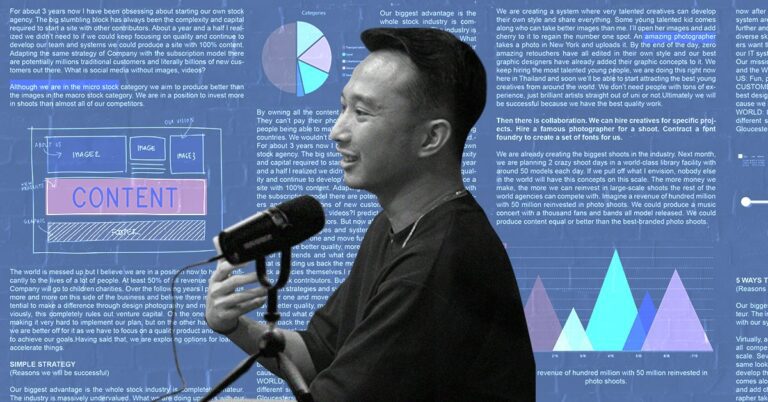Truelogic Episode 86 Recap: Are Backlinks No Longer a Google Ranking Factor?

Last September, Google announced backlinks as not one of the biggest factors for ranking anymore. Gary Illyes, an Analyst on the Google Search team and one of the best sources of insider Google information, suggested SEOs may be overestimating the importance of backlinks by saying that he no longer believes that they are a top 3 ranking signal.
In today’s episode, let’s explore how Google’s perspective on the importance of backlinks has evolved, as shared by key figures within the company, and what this means for modern SEO strategies.
Podcast Transcription
Berns San Juan: Hi guys, and welcome to another episode of the Truelogic DX podcast. For a lot of years now, SEO providers like us and other SEO professionals in the country and internationally always spout that the three most potent ranking factors, the three things that are most likely to influence whether you appear on the first page of Google or not, is the savviness of your technical SEO, the quality of your content and the quality of your, the quality and volume of your backlinks. Those have always been the top three ranking factors. And then you can add localization to that and mobility to that and whatnot. But the big three look like they’re getting a shakeup. It seems like backlinks are getting a downgrade.
In September, Gary Illyes mentioned that SEOs may now be overestimating the importance of backlinks and that he no longer believes that they are part of the top three ranking signals. Now where did SEOs get this idea about backlinks being necessary for search performance?
So in today’s episode, we’re going to talk all about backlinks, Google’s perspective on what backlinks are, how they’ve evolved, and then what this means for you, most importantly, what this means for you.
Role of Backlinks in SEO
Backlinks are actually, a concept that was invented by Google, before Google went into the search market, like before Google started playing in search. So we’re talking pre-1998. There wasn’t even the concept of a backlink, the primary relevant signal that most search engines at the time used. So you’re talking about AltaVista, Lycos, Yahoo, like the older search engines. What they used to use was keyword density as the primary signal to whether a page was relevant for an idea. And that’s because search engine technology was still very primitive.
Larry Page thought there must be a better way, there must be better signals to figure out whether something is relevant for an idea. And so he goes into a library, he takes a look at how libraries organize ideas, and what he did was, and this was at the Stanford library. And he’s wondering, I wonder which is the most relevant book in this library? So he goes to the card catalog and the index, the index of the library, and he looks for which book is the most cited across all books in the library. And what he finds is that it’s Einstein’s general theory of relativity. And so he’s wondering okay, how do I replicate this?
That’s why, before Google was Google, they were called BackRub, like when it was still a Stanford paper. Google was called BackRub because he was going to ride on the concept of backlinks as a relevant signal and not lean entirely on the keyword density to derive the context of a page.
So today, backlinks are just mentions of your brand or a discovery term that leads back to your website. But, in short, it’s the number of times other websites reference you for a subject matter, reference your brand name, or point a link back to you, just altogether. Like, even an anchor text that says read more, click here, and then that brings it to your website. Those are backlinks.

If you think about the functional purpose of a backlink, the functional purpose the backlink is sort of similar to, I’m not sure if books today still do this, but books back then used to have items that were called footnotes and references at the bottom, where, if you were more curious if an author was citing a source, they would indicate the source at the footnote and then it would be at the bibliography of the paper. So that’s what backlinks were supposed to function as. They were supposed to enrich your discovery experience with a piece of content by telling you oh, do you want to read more about this? Then look for this book.
Today, we don’t have to look for the book, we just click the link and go to the reference. So, sure enough, backlinks were used as a relevant signal. And I would say, as late as 2016, and 2017, there were members of the Google team that continued to affirm that backlinks were one of the big three ranking factors, and today links, I would say, continue to play a very important role.
HubSpot surveyed all marketers and 51% of the marketers they surveyed said that they observed positive improvements in search visibility and search performance whenever they used linking strategies. Userp did a study, which they published in their state of link building, and said that 67.5% of SEOs believe that backlinks still have a big impact on search engines.
So grain of salt, I nuanced, agree, I qualified, and agree, although, full disclosure only one in four SEO projects that are done by Truelogic incorporate backlinks into their strategy. Three out of four do not. I usually like to tell people, that backlinks are strategies of last resort. You do backlinks when you have exhausted every quality factor, every technical factor, and every content factor that you can. Once you’ve exhausted those, okay, let’s do link-building. But before that, you ought to try to exploit every potential optimization you can within your website, which is an owned asset.
So I think the problem with, and it was inevitable I think. If anybody is a pretty decent SEO, they will probably know that backlinks sort of had, their time would have come where they became less and less and less relevant. And Google warned of this, years and years and years ago. The problem with current backlink practices is that they can be somewhat abusive. I’ll go into a little history in a bit. But they can be a bit abusive because SEOs realize that backlinks, sometimes without on-page, without terrific content, by just flooding the internet with meaningless backlinks, you can still get a, you can still appear on the first page on just brute forcing backlinks.
Although, again, good link-building is pretty expensive. So, but, there is cheap link building. It can work. I don’t advise it, but it is right for abuse. It’s right for abuse and it’s led the industry to some black hat SEO practices. It’s led to some spammy websites and the creation of some spammy websites. In short, it did not make the internet a better place. I would say for every meaningful website there is, out there, there are nine meaningless websites that exist only to point a link to a client.
Google’s Backlink Stance Over the Years
Berns San Juan: So what has Google stands, been on backlinks over the years? So anecdote warning, I was having dinner with Denise Haak a couple of nights ago and she asked how many versions of SEO she had seen. And I could only respond. There have been so many generations, iterations, and ages to SEO in just the past 12 to 14 years. And just off the top of my head here. We went through the age of keyword density the age of may the most backlinks win, the age of the Panda and the age of the Penguin and the age of Freshness and Mobile-first and YMYL and E-A-T and Trust and the Hummingbird and RankBrain.
So each one of those things that I mentioned and there are easily another two dozen more that I could mention were relevant changes to how backlinks work, but I will talk about the two most relevant ones when Google started cracking down on abusive link-building practices. In 2011, Google rolled out, if I’m not mistaken, this was March 2011. In March 2011, Google rolled out what was called the Panda algorithm. Now again, if you’re a practicing SEO, then you’d know the Panda algorithm is an on-page also. It’s a quality algorithm. What it does is it gives you a score and it modifies your relevant score based on how good your content is and how original your content is. Mostly originality more than content quality.
But what the Panda algorithm was trying to go after were the websites that did not have original quality content, just websites that had, it was just, it tried to kill article farms, like if there’s a nice way to say it. So what the Panda did was, it was an algorithm that was designed to take a look at, whether are you a legitimate website or do you exist only to point links to somebody else. This means your content will be shoddy, it will be bad, it will be short, it will not be well-researched, and will be written by somebody who’s not an expert in the field. It will not be, it is not well-resourced, and it’s on a shitty page.
So what the Panda algorithm essentially did was it killed those websites. It says this website has thin content. This website has thin content. It creates no value for users. Penalty. This website only copies content from another website. Penalty. Oh, your website shares content with five other websites. Only the brands are different. Penalty. So the Panda algorithm was one of the first major algorithm updates that Google did that had a penalty action.
Back then, when Google used to roll out Mayday, Florida, Caffeine, Brandy, yes, your performance would go down, but that was less a function of a penalty and more the function of that new algorithm preferring a metric that is present on some websites. So Google likes other websites more than you. And so it was a preference activity, not a penalty activity. The Panda had a penalty action, and it hit thousands upon thousands of low-quality websites. So that was the first.
The year later, not even a full year later, actually about 11 months, about Feb of 2012, Google rolled out the Penguin algo. And the Penguin algorithm penalized a bunch of or was penalizing, websites with links, with what looked like link schemes in their footprints. Like, I’ll give you guys a couple of famous ones. If you used to book tickets in the 2010s, in the early 2010s, then you would have been familiar with CheapOair. Like, they were that decade’s sky scanner. CheapOair used to rank for everything. If you typed in flight from X to Y, you would get CheapOair. They were super relevant, they were the kings of rankings for airline bookings.
And they got a penalty. And it’s because what Google realized was in their footprint, there was an unnatural distribution, like their backlinks were too uniform, like all the same authority, all using the same keywords, rarely the brand name. And so Google told him, wait, that’s weird. Like, there’s no randomness in the distribution, there’s no naturalness in the distribution. That kind of link, that kind of footprint, could only be done deliberately. Like, you had to influence those backlinks to happen. And so CheapOair got a penguin penalty.
Another famous one is JCPenney did not just get a penalty, they got sandboxed. And sandboxing is the penalty where Google takes you off the index for a certain period. JCPenney got a penalty because they were outranking the Samsonite brand for the name Samsonite. So if somebody typed in Samsonite, the JCPenney website came up, not the Samsonite. Like, they came before the Samsonite website. And Google was thinking, that’s weird, because JCPenney’s name is not Samsonite, how could they outperform Samsonite for their brand?

And so, even before taking action, Google is thinking, is there something wrong with our algorithm, is there something wrong with our equation that we as a search engine are preferring JCPenney to Samsonite for the name Samsonite? And what they realized was that more websites link back to JCPenney for the word Samsonite than there were to Samsonite. And again, Google’s logic there says, but that’s not possible. That’s weird. Why would people link the term, the anchor text, and the word Samsonite to JCPenney’s product page and not to Samsonite if the text only refers to the brand? That doesn’t make sense unless JCPenney incentivized the link pointing to, the link to point to them versus the Samsonite. And then, you know, Sandbox.
So these were the two major algorithm updates. And link building has been pretty contentious. Most of the time when people say, ethical SEO, they’re not talking about technical SEO and they’re not talking about on-page. It’s, they’re talking about link building. If people are talking about black hat versus white hat versus gray hat SEO, they’re not talking about content, they’re not talking about technical SEO, they’re not talking about mobility, they’re not talking, they never talk about site speed. They’re almost always talking about link building because ethics, the ethics question is only movable in the back, in the bank link space, in the link building space. And, again, this is why it is not our preferred SEO activity.
So Matt Cutts, who I would say was, who I might say was sort of Google’s ambassador to webmasters all over the world, said as early as 2014 that they would become less and less important. I remember him getting quoted as saying, “Guest blogs put a fork in it.” Like, that’s literally what he said. He said, “For those of you that use guest blogs, stick a fork in it.” So Matt Cutts also said, and I quote like, I think backlinks still have many, many years left in them, but inevitably, what they’re trying to do is figure out how an expert would say this particular page matched their informational needs.
For the most part, people care about the quality of the content on that particular page. So I think over time, backlinks will become a little less important. And so he was already queuing people. He was already cluing people in on the fact that backlinks will become less and less relevant. In the search quality strategist of Google in 2016, Andrey Lipattsev emphasized the importance of backlinks and he was one of the guys who confirmed that backlinks were one of the top three ranking factors in terms of whether something would appear on Google or not.
Duy Nguyen, on the Google search quality team, in November 2022, said backlinks as a signal have a lot of significant impact compared to when Google search first started many years ago. We’ve got robust ranking signals hundreds of them to make sure we can rank for the most relevant and useful result of the queries. And then John Mu, right? John Mueller, Google’s senior search analyst, and he’s the team leader of Google search relations.
He interacts with people that go on Google webmasters, [have said] in a November 2022 podcast that it’s something where I imagine, over time, the weight on the links won’t be such a big factor as it is today. I think already that’s something that’s been changing quite a bit, right? And then, of course, in September this year, 2023, Gary Illyes confirmed that it is no longer one of the top three ranking factors.
What Does this Mean for Businesses?
With that long story behind us, what does this mean for you, the business owner? What does this mean to you, the SEO client? Link building is expensive. It is expensive. It’s an, especially if it’s done right. It’s not cheap. Like, I try to tell, when I give people options for what to do with their SEO, I would tell them, I can spend six to 12 hours trying to get you a backlink, or I could spend six to 12 hours creating new content and making your pages faster. What would you rather have me do?
Because you will get one backlink. Like, one backlink will take you about six to 12 hours, like with the creation of the content, finding the right blogs and the right websites to partner with, getting them to review it, with responding to the webmasters of those websites. It takes about six to 12 hours to acquire a legitimate backlink. So would you like me to work on your content, your site speed, and your mobile compatibility, for six to 12 hours? Or would you rather, I get you a backlink for six to 12 hours, right, like?
So that’s sort of the trade-off that you do there. What I will say, though, is, that if you are implementing an SEO strategy and if more than 50% of the bandwidth of the time of the resources are put into link building, you probably want to review your SEO strategy again. Right, like with backlinks not being one of the big three ranking factors anymore. By the way, I put a grain of salt when Google says that. I don’t think they will become irrelevant anytime soon, and I’m not trying to give you the impression that backlinks throw them out the window.
They are still valuable. I would still do them when necessary, but I would like everybody to appreciate that they will not give you the bang for your buck that they, that they’re not enough to give you the bang for their, your buck that they, that you used to get, at least, you know, September 2023 and onwards. So if you’ve got a lot of backlinks, if you’re investing in SEO, if you’re doing link building, and if you’re spending for those links, like if you’ve got an SEO agency and they’re link building for you and more than 50% of your budget goes to your link building, you want to reassess your SEO strategy, because backlinks are not going to do it.
Again, I would also encourage you to ask what the, to ask your SEO provider or your SEO team what the role of link building is to them. It cannot be the foundation of their strategy. Link building has to be their last-mile strategy, right? Like, this means they’ve done everything required on the technical side, on the content side, on the mobile side, and on the content quality side. Like, they’ve done every optimization they can and now it’s just time to push you from position nine to four, position four to two, position three to one. Like, that’s what backlinks are meant to do.
If they’re just leaning on backlinks to get you from nowhere to page two, from nowhere to page one, you want them to, you know, take five, or you know, take two, three steps back, take a look at what they’re doing and reassess whether this is what they want to continue to do.
With that, thank you for joining us here at Truelogic DX. This is pretty big news for SEO. So if you’re an SEO listening to us, thank you very much. Give us a shoutout on social media. Whether or not you’re an SEO, we do listen. Our marketing team is looking at your comments. And if you’ve got topics, suggestions, or people you’d like us to talk to, let us know. Truelogic DX is available on Spotify, Google, and Apple accounts. And as always, we continue to be powered by our marketing team and our friends at Podmachine. See you in the next episode. Cheers.










